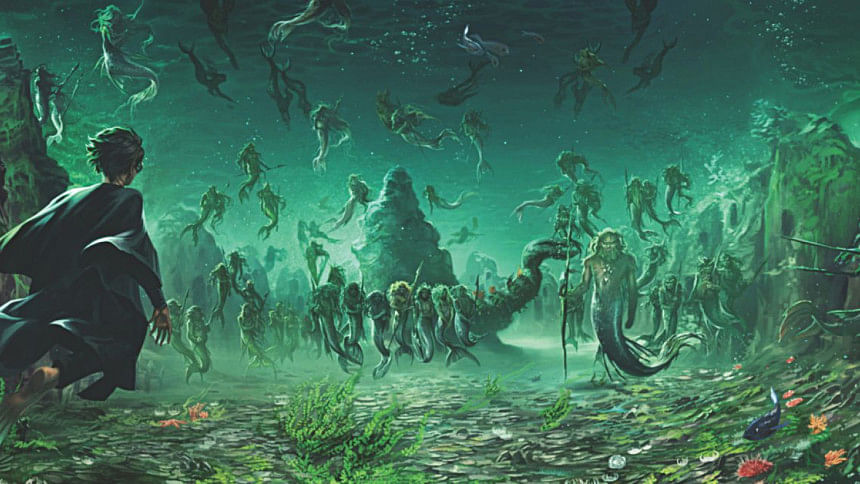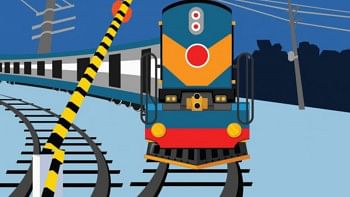OF SPELLS AND QUILLS - EXPLORING MAGIC IN LITERATURE


It is not every day that you come across a conference on magic, yet you have a brush with magic almost everywhere. You sneeze, somebody says, 'bless you!' Apparently, your heart stopped for a while and you are blessed to be revived, or you are 'blessed' because some evil spirits (read germs) have just left your body. You check horoscopes before you set off for the day. You consult a holy man before setting up an auspicious day. These are the things that we do without any rational explanations. You may say these are mere superstitions. They do, however, fall under a broad category of magic that involves our belief in the irrational, non-rational or things that are fantastical.
I was part of a team that organised a two-day international conference on magic and literature at the University of Liberal Arts Bangladesh on May 27 and 28. The idea of the conference came during my visit to Kolkata in January. Prof. Subir Dhar of Rabindra Biswa Bharati University was one of the event organisers in which I presented the keynote paper on Shakespeare. It turned out that Prof. Dhar and I shared a common interest in magic. To my surprise, he mentioned that he had decoded some of the magic mentioned in different renaissance texts, and he could actually perform them. And my instant response was, "You must come to Dhaka and we will do a conference on magic!"
A call for papers was circulated, and we were overwhelmed by the responses. There were more than a hundred people interested in presenting their ideas. It seemed there were so many enthusiasts out there who wanted to talk about their passion for magic at an academic forum. Not surprisingly, most of them were young scholars or graduate students. Some of them talked about magic in literature, others on the magic of literature. As conference organiser, we were happy to provide a discursive space for magic and literature.

Let me contextualize the issue. There are many faces of magic in literature. Prospero's art, Keats's 'charm'd magic casements,' the satirical sylphs in Pope's 'The Rape of the Lock,' Yeats's occultism are some of the faces of magic that we meet in the syllabuses of the English departments. We are comfortable in dealing with magic as a component of fantasy fiction—a long tradition that includes Homer and Apuleius, the Holy Grail, The Faerie Queene. We are happy to see the re-emergence of magic in the works of contemporary authors such as J. R. R. Tolkien, C. S. Lewis, Ursula K. Le Guin, J.K. Rowling and others. We find it safe to identify magic as an innate talent of the author, as an object of desire, an enactment of words, or an enchanted place. But seldom do we get to discuss magic as a cultural worldview that has disappeared or changed over the course of time. For example, in our classrooms, we discuss Frankenstein as the alter ego of the creator, but not necessarily with reference to the neo-Platonic synthetic magic of Agrippa that led Dr. Frankenstein to create his monster. We talk about the existential crisis of Doctor Faustus, but not the secret codes of necromancy that led him to make a pact with Lucifer.
The dichotomy unfolded when our proposed chief guest, a leading magician, refused to inaugurate our conference. In spite of his initial promises, he backed out fearing backlashes. We realised we were in for a rude awakening as we are living in a dangerous time when a highly appropriated form of magic is flooding our media while an extremely orthodox interpretations of religion are taking over our cognitive faculty. Dr Subir Dhar in his keynote speech made this idea clear. He explained how belief in magic, specifically in the performance of supernatural or paranormal deeds and actions by certain skilled, talented or learned individuals, has existed as a staple in world literature since the dawn of civilisation and how in traditional literary criticism and theory there appears to exist a major disregarding of the role of magic in literature. He proposed to analyse literature through the contradictions of our times that on the one hand demand the presence of magic and on the other occludes any serious discussion on it.

So what is magic: is it a type of religion, a primitive form of science, or an ultimate trick that—like money—creates illusion? Why is the media suddenly flooded with magical fantasies? Why does a rational society like ours subscribe to an apparent irrationality? Why are we becoming wise of the other-wise? These were the guiding questions that we wanted our participants to explore during the conference. They responded by sharing their ideas on magic and culture, tricksters, magic and popular culture, magic realism, magic and commodity, magic and memory, magic and resistance, magic and reality, magic and nature, magic in the time of Shakespeare, and Magic and textuality, magic and religion, magic and influences, magic and place and so on.
One of the things that came up repeatedly during the conference was the ambivalence towards magic. While writers use magic for a wide range of purposes, they are not sure whether they should really believe in it or not. Such is the pressure of the Enlightenment epistemology. For example, Ted Hughes wrote that he saw angels hanging on to the jetty; but he changed them to Pikes while writing his famous poem. He did so because he was not sure to what extent he should talk about non-rationality in a rational society.
The urge to be taken seriously has influenced the way magic is presented in literature and culture. No wonder, Harry Potter's success lies in the fact that the teen wizards are engaged in mystery solving missions. Their irrationality is presented with the aura of rationality. It strikes a raw nerve in us because Harry is an ordinary boy who has the potential of being extra-ordinary. Hermione Granger is a muggle-born. Her family does not have the blue blood of a magician. Yet with her dedication she can become a true wizard. Their success as wizards projects a type of magical wish-fulfilment, an idea that has been cashed in by smart writers and filmmakers. They could have used their fantastic tales to turn us into passive consumers by befuddling the line between rationality and irrationality. We neither believe, nor disbelieve. In the process, we become zombies who have lost their decision making power. Magic has become a billion-dollar profiteering business, the plenary speaker Dr. Azfar Hussain, Associate Professor , Liberal Studies at Grand Valley State University maintained. By equating money with magic, Dr. Hussain showed how Marx and Shakespeare foresaw money as a magical commodity that wields power.
Magic has always been an integral part of human culture. In hunting-gathering society, for example, sympathetic magic was used to tame a prey, control their surrounding or harm a victim. Magicians have historically been both revered and feared for their supernatural power. The word magic has its roots in magos: 'one of the members of the learned and priestly class,' from Old Persian magush. We all know about the Magi or the wise men who foretold the birth of Jesus Christ. But with the advent of Christianity, Magus (the singular form of Magi) assumed a negative connotation. Simon the Magus in The New Testament is a case in point. Magic soon became a dark force, although earlier Moses himself performed magic.

When Muslim scholars excelled in Alchemy, magic was branded as a kind of esoteric knowledge available only to the Other of the West. During the middle ages when Europe was busy burning its witches and sprinkling holy waters to purge sinners and plague victims, the hakims of the Middle East could offer some cure. The Christians conveniently interpreted such medical miracles as evil magic—after all disease is a visitation by Satan, and which understandably was not affected by their holy waters. Therefore those who could cure must be the practitioners of dark magic. The racial undertone of magic was pointed by none other than Edward Said in his Orientalism.
This brings us to the discussion on the fear about the Other. When Macbeth sees his future in the blood cauldron of the witches, he was looking into the other side of the mirror. He was looking deep into his own. The source of his violence is rooted in a deep seated ambition that lies repressed in him. So when the zombies in Michael Jackson's video of Thriller open the lids of the graves and hit the streets, we witness the return of the repressed Other. Instead of individual memory, only this time a racialised Other is making its return into the mainstream. Just imagine a zombie movie and then compare it with the refugee crisis that you see in the Mediterranean Sea. You will understand the magic of fear, and how it is being orchestrated by popular media and making us complacent about the Other.
The conference also heard how magic could also be used as a site of resistance. Magic realism in Latin American fiction, voodoo in Afro-Caribbean writings, shamanic songs and narratives of the Native Americans are some of the examples that were cited during the conference. After all, as Freud posits while discussing sympathetic magic, one of the basic tenets of magic is similia similibus curantur: "like cures like". You need magic to cure magic. You need Gandalf to deal with Sauron. In other words, we need to talk about magic to understand its resurgence and appropriation.
Professor Shamsad Mortuza teaches at the University of Dhaka. He is Advisor, Department of English and Humanities, ULAB.

 For all latest news, follow The Daily Star's Google News channel.
For all latest news, follow The Daily Star's Google News channel. 



Comments